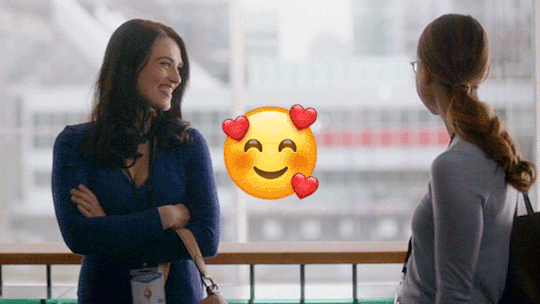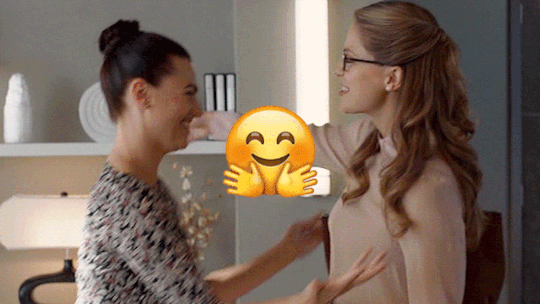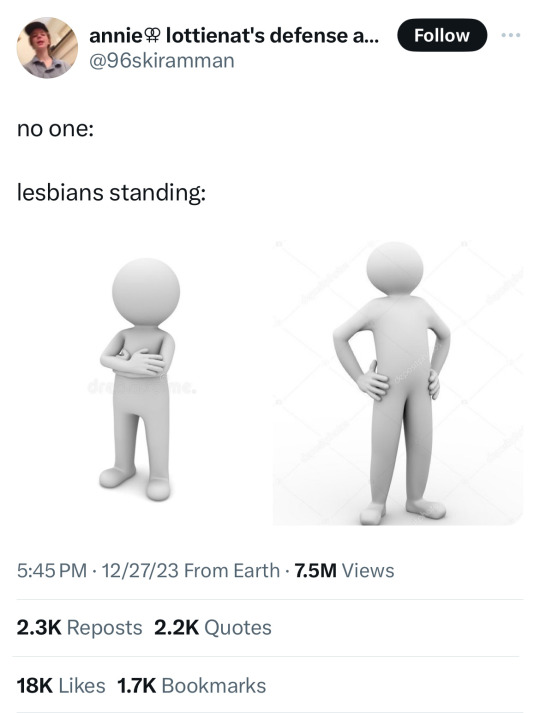Text
DEO: Department of Extra-normal Operations
This will be an essay that looks into the ethical problems of the DEO. For the purpose of this essay, I am not concerned about the showrunners reasons for their decisions for how the show presents the DEO. I care only about examining the worldbuilding and stories inherent within the world created. So let's dig into some philosophy and theory. Whee! [Minor spoilers]
To start, this department was first created within the Superman/Supergirl universe in order to analyze alien activities after Superman reveals himself on Earth. It's made in retaliation to the appearance of powerful aliens that those in power deem possible threats. Already, the DEO's beginnings are rooted not in true protection but in stopping and eradicating what those in power deem a threat. It's roots start with dubious ethics.
Let's examine it's history:
It was led by Hank Henshaw, who is vehemently anti-alien. Henshaw is also slated to have ties to Cadmus, which experimented on aliens and attempted several rather horrific and genocidal attacks on aliens. (Note that in Supergirl: Season 2, Kara and Lena thwart Cadmus' activities. Lena Luthor saves the day by modifying an alien killing virus to be harmless to all living creatures. Bits and pieces of the worldbuilding around Cadmus showed that the aliens experimented on came from DEO facilities.)
Henshaw dies when Jeremiah Danvers "kills" him when saving J'onn J'ozz, who then takes Henshaw's place until exposed. He recruits Alex sometime before his exposure (Season 1). After J'onn is exposed in Season 1, Lucy Lane takes control. Then after J'onn helps Supergirl defeat the murderous Kryptonian Non, J'onn received a presidential pardon and was reinstated as director. He kept Henshaw's guise for publicity sake.
The show makes it clear that J'onn choses to be the Director to change the DEO. Yet, what evidence is there that this actually happens?
So that's the basic history.
We have a clandestine agency that has unethical procedures that doesn't change under a new director.
The DEO picks up aliens and throws them in a cell to never be seen or heard from again. This would likely terrorize the alien neighborhoods. This is never truly address in any meaningful manner by the Superfriends or Kara.
In fact, if anything, the show positions the DEO as being Good if Alex, J'onn, or Lucy are in charge (Kara, ironically is not in charge of the DEO at any point). However, the DEO becomes Bad if Lex Luthor or Lauren Haley or the real Hank Henshaw are in charge.
This creates a rather large ethical problem.
First of all, the worldbuilding builds up the argument that certain people are good and certain people are bad. The person we see skirting between those two extremes, and living in a morally grey area the most, is Lena Luhor. For the purposes of this essay, I'll put a pin into Lena's characterization and focus only on the DEO.
Secondly, we are told again and again what Kara/Supergirl's ethics are: justice and truth. Yet when we examine Kara's actions within the context of her DEO Supergirl duties, we are confronted with the following:
She must hide her identity, even from her best friend Lena, and thus deceives regularly. Her reasons for not telling Lena are rooted in the pressure from those at the DEO to not tell Lena but also in Kara's intense fear of loss. However, Kara will demand truth from others despite her hypocritical actions. This doesn't seem to fit solidly in the "good" category.
Her "justice" is defeating criminals. Humans go to the police to eventually have a fair trial. However, aliens are not afforded that same right. Her justice for aliens becomes judge and jury. Since she professes to "not kill," she at least doesn't extend that to executioner. This again doesn't fit solidly in the "good" category.
Thus, by examining Kara/Supergirl's actions, we see a disconnect with what the show claims is "good:" truth and justice. Yet, there is no true justice for the aliens fought and captured; their rights are rescinded (if they had any at all).
This is why the show must tell us who is "good" and who is "bad," because people's actions do not fit the show's claims of what "goodness" is versus what "badness" is. Thus the worldbuilding ends up defining Kara's actions as always "good" even if those actions cause harm to those around her.
[Side note: This isn't to say that Kara is "bad." It is to say that the binary within the show's worldbuilding lacks nuance for the complexity within Kara's understanding of the world and how she acts within that understanding. This binary simply cannot allow for such a complex examination as there is no room for it.
Because of this binary, the show actually butchers Kara's character to make her past "not good" actions as somehow "right" and "good" in the end. We see this with how Kara's harmful actions toward Lena (the lying, duplicity, deception etc) is turned into "I did just one mistake" when it wasn't one mistake. It was years of harm, but because the show paints Kara as "good," Kara is not allowed growth.
This binary of good versus bad is already nonsensical in the worldbuilding since Lena Luthor's very existence throws this entire frame out the window. Her actions, always with the intention to do the least harm and try to improve the world, don't fit neatly into the binary. The story often punishes her for this. (She breaks the binary too much I suppose.)
Yet when other people's actions fail to fit neatly into the binary, the show whispers: "Hush, don't look or think, believe us when we say this person is good and this person is bad.']
To reiterate: It's okay to capture aliens and disappear them without any right to trial If the Superfriends are doing it. This good/bad definition collapses ethics into meaningless words since the activities and procedures of both the "good" people and "bad" people don't differ in terms of impact on alien communities. This lack of differentiation is why we must be told who is good. Otherwise, how would we know?
To dig a little deeper, in Season 4, when Kara is on the most wanted list, she learns very little about the true plight of aliens. During this time, the DEO becomes "bad" under the control of Lauren Haley. Lena Luthor and Alex Danvers, who are both working with the DEO still, also work against the DEO but only to clear Kara's name. So justice is done for Kara's sake but not for the other impacted alien communities.
Once Kara's reputation is restored and she's no longer deemed an "enemy of the state," Kara returns to working with the DEO, as it is now labeled as "good" again because Alex is back in charge.
Ironically, the only person in Kara's friendgroup that questions the DEO is Lena Luthor. (Who in Season 5 will have her 'villain arc' only to be redeemed to the good side again at the end of Season 5. She's the only character, who is labeled a villain at one point, that is allowed true redemption.)
We learn very little about what alien communities actually think about the DEO and about Supergirl in particular. The most we get is the Children of Liberty plot line of Season 4; however, this plot line doesn't ever give us a solid viewpoint from impacted alien communities. Instead, we are confronted with:
We are told what alien communities are like and how lacking in rights they are. Very little of this is shown directly outside of "criminal aliens." Or the brief glimpses within Manchester's arc. However, Manchester is viewed as 'in need of redemption' despite having very real grievances with the state of things. The show then tells us that Manchester is 'bad' and the 'good' J'onn and friends must stop him.
The second time we see alien daily lives is Nia's return to her hometown, which is attacked by supercharged humans. This blended town of aliens and humans serve as an outlier. Nia actually admits that the town is unique and not representative to most aliens' experiences. So again, we don't see a direct experience of alien life in National City or other major cities.
Aliens either have significant powers that humans can justifiably find scary or they are human-like with little to no powers. Both are treated the same for the sake of the Children of Liberty plot line, which serves as an immigrant allegory. @fazedlight and @sideguitars did excellent analysis on this and the problems of these allegories based on the worldbuilding and story itself. (Note: thank you to fazedlight for finding the post in question! Click here o read their analysis.)
This makes it easier for the show to pretend that the DEO is "good" when the Superfriends are in charge. Since we don't meet alien families harmed by the DEO's actions, we never truly get an alternate perspective.
Even Lena Luthor's critique of DEO is spat upon by the story, where her alien friends fail to truly counter her valid points. Instead, it's presented in the good/bad binary, which erases all nuance and ethical considerations.
Let's also consider the start of the Supergirl career. Kara is captured by the DEO 12 years after her initial appearance on Earth. However, prior to this moment, we had learned that Kara had nearly been taken by the government -- specifically Henshaw's control of the DEO. Jeremiah Danvers agrees to work for the government in exchange for Kara's freedom from being a government asset.
However, her saving Alex's flight puts her in the crosshairs of DEO, and eventually she is captured. Upon which she learns J'onn is in charge (not the original Henshaw), and J'onn's goals are revealed. He allows Kara to fight her first alien fights as Supergirl. Here we see that J'onn's methods have not actually changed anything about the DEO.
The alien fight results in that alien being captured. Supergirl/Kara never hears what happens to the alien she fought and captured. No thought is given to the rights of that alien or if a fair trial will be given. Instead, we are told the alien is a "criminal' as if that somehow justifies the brutal treatment.
After Alex reveals she's an agent with the DEO, Kara fully trusts the agency.
So Jeremiah gave up his life to make sure Kara wasn't being used by the government, only for Kara later on working for the DEO, which is part of the government. Thus Kara ends up used by the government after all. The irony here.
Kara's blind spot here is:
she's privileged. A white-passing, human-passing alien. It's easier for her to hide as a human and not be clocked as an alien. Also, she's white, so less likely to deal with the complications of racism. The most she has to deal with is sexism and the DEO's procedures. This means she doesn't experience the worst the DEO and the systems that uphold it dish out to aliens.
Kara hasn't really interacted with aliens outside her friend group. She's relatively sheltered since coming to Earth due to Kal placing her with the Danvers and having to hide herself. She has no real knowledge of how aliens survive on Earth. This means she has nothing in which to compare the DEO's claims.
She blindly trusts Alex when it comes to DEO.
We don't see Kara questioning what happens to aliens until Season 3 (if it happens in season 1, I apologize as that season is a bit hazy for me). Here Psi saves Kara's life during a perilous mission. Kara then asks about her accommodations and finds out she has no window in her cell. She then demands Psi be given a cell with a window.
However, notice who Kara takes with her on that Season 3 mission: LiveWire (human but due to an accident became Livewire, so she's not an alien but a meta-human) and Psi (who is labeled a meta-human). So the two incarcerated people that Kara chooses are meta-humans and not actual aliens.
So again, we never see Kara interact with aliens outside her friend group unless she is interrogating them. Once the DEO is done with interrogations and the case "closed," those aliens disappear into these windowless cells. Which, need I remind that solitary confinement is labeled as torture for a reason?
Yet that is where aliens that are dubbed "too dangerous" end up by those with power. No rights given; left trapped in solitary confinement with (likely) no windows to never see the light of day again. Of course, because we are told the "good" people do this, it is thus "okay," despite it not differing in methodology with what the "bad" people did.
2. DEO's procedures don't match law. This is especially true when alien amnesty is put into law.
DEO changes NOTHING about their procedures after alien amnesty is put into law. This means that although aliens now have a legal right to a trial, the DEO does not provide this for them. No captured alien is given this right.
This means the DEO doesn't operate within the law.
So if the DEO can disregard laws if they so desire, then what is to stop them from terrorizing any citizen regardless of whether that citizen or alien or human?
What exactly is the ethics of the DEO?
Is the ethics dependent on who is in charge? But if one compares the tenure of the directors: Henshaw, J'onn, Lucy, Alex, Lauren, and Lex -- we see no difference in how the DEO acts.
They all target aliens and give them no rights. The aliens vanish into the cells never to be seen again. This includes some meta-aliens.
Some will claim that while the Superfriends are in charge only criminal aliens are thrown into solitary cells with no hope of release.
But that begs the question: Why do the Superfriends get to be judge and jury and/or executioner? What makes their decisions good but Lauren Haley's or Lex's or the original Hank Henshaw's decisions bad?
Why do the Superfriends get to decide that criminals get no right to a fair trial? Why do they not interrogate what is causing the criminal behaviors in order to change the conditions to avoid aliens resorting to "criminality" as defined by them?
In the end, it does not matter why an alien or meta-human engages in what the state has deemed "criminal" behavior; the methods used in capture and the end result is the same regardless.
The families of captured aliens see the same results regardless of whether "good" people or "bad" people are in charge of the DEO.
While alien amnesty is in law, the DEO, who is under Superfriend control at the time, does not alter their procedures to give the aliens they capture any rights. We never see the aliens or meta-humans captured ever given a fair trial. Nor do we see any programs to reform "criminals" or give them any chance at parole or redemption.
The only method for dealing with aliens and meta-humans uses a carceral prison system that is based in solitary confinement torture. Even the interrogation procedures used have elements of torture to them. In fact, many of the "interrogation" procedures use leading questions to entrap and force a confession under duress. None of these methods are conducive toward reform or fixing a system that deprives those captured of all rights.
Alternate systems for dealing with criminals are never explored. We never see transformative or restorative justice utilized. Both systems would require extensive dialogue with the communities harmed by the "criminals," and if there is one thing the DEO fail at consistently is dialogue with the impacted communities. Instead, their approach is top down, where their ideas of what is right and best is pushed down upon the communities they claim to serve.
Part of this lies with the fact the Superfriends can't engage in dialogue as long as they adhere to the oppressive methodology and practices of the DEO. Reform has failed to alter the ethical violations within the DEO. Alex Vidale wrote an excellent book called The End of Policing, which digs into the attempted reforms for police and how they have consistently failed. Vidale writes:
“At root, they [reformers] fail to appreciate that the basic nature of the law and the police, since its earliest origins, is to be a tool for managing inequality and maintaining the status quo. Police reforms that fail to directly address this reality are doomed to reproduce it.”
The DEO at its root was created to manage the inequality inherent between human rights and the lack of any rights for aliens. It was also created to control aliens and maintain a human status quo. The Superfriends attempt at reform fails to address this reality, and thus were doomed to repeat it.
Vidale continues:
“Police argue that residents in high-crime communities often demand police action. What is left out is that these communities also ask for better schools, parks, libraries, and jobs, but these services are rarely provided.”
Services to better the conditions of so-called "high-crime" communities are not shown to be rendered in the Supergirl world, while the Superfriends are in control of the DEO. It is not more policing that is needed, but more services which do not get provided for most of the show's story and worldbuilding. Thus, the communities that struggle with survival, who often must resort to "illegal" or "criminal" ways end up with only punitive measures that continue the cycle.
It's only in Season 6 when the Superfriends are no longer with the DEO that we start to see them engage in dialogue with the community in general (Kelly's arcs in particular touch on this for the lower income area that she tries to help, which is shown to be a mixture of nonwhite humans and some aliens).
If J'onn and others truly are seeking to reform the DEO, then that requires them to be in dialogue with the affected communities and to put forth new procedures that provide rights to those impacted. This is never done.
3. The DEO suffers no consequences for its actions.
The "Bad things" that happen under the "Bad" directors -- original Henshaw, Lauren Haley, Lex -- aren't ever addressed. Nothing really changes; instead the "Good" guys get back in control and things continue.
Was any reparations made for those harmed by the bad actors? Are the families impacted ever given compensation? We see some aliens rescued from Cadmus in Season 2 and Lex's Power Plant in Season 4, but what of the families of those murdered by Lex and Henshaw? The show fails to address this.
Instead, we are told that the "good" people are now in charge again and only "criminals" are being taken and incarcerated with no rights.
The concept of "criminality" depends entirely on who is in a position of power to dictate what constitutes "criminal" acts. One of the biggest problems with "criminality" as a concept is that it fails to interrogate the why these behaviors happen. What led to the "criminal act?" Are the people engaging in the act just "bad" people?
Often when basic needs are not being met, people may engage in acts of desperation to meet those needs. These actions may fall under what that society deems as "criminal." However, if the people's needs were met, then they wouldn't need to engage in desperate acts to meet their needs.
Another reason for "criminal" behavior stems from people who lack rights in a society. The oppressed will often fight against their oppressors using a mixture of methods (sometimes nonviolent, sometimes violent) in order to win their rights and transform society for the better. Until they win that fight, their actions are labeled as "criminal" by those in power.
Some rarer individuals may engage in acts of harm because they enjoy it such as Lex. However, this is actually very rare. Property crime and burglary is far, far more common. Yet, even those engaging in horrific violent crimes are still afforded a fair trial. Something aliens in the Supergirl universe are never given.
There's quite a few scenes where the aliens fought by Supergirl are engaging in robberies/burglaries or other property crimes. Those that seek to violently mass murder is actually rarer, and often the big villain of the season. At no point does anyone in the show reckon with the reasons someone may choose to engage in "criminal" behavior. Instead, all "criminals" are painted as "bad" regardless.
J'onn professes to be "reforming" the DEO to stop its reign of terror among alien communities. Yet, the most crucial components in changing an oppressive system? We don't really see him utilize them until Season 4, but by then the DEO is in the hands of Alex, who continues the procedures put into place by J'onn,
Paulo Freire writes in Pedagogy of the Oppressed concerning the "radical" as in the person seeking to end an oppressive system:
"The radical, committed to [human] liberation, does not become the prisoner of a 'circle of certainty' within which reality is also imprisoned. On the contrary, the more radical the person is, the more fully he or she enters into reality so that, knowing it better, he or she can transform it. This individual is not afraid to confront, to listen, to see the world unveiled. This person is not afraid to meet the people or to enter into a dialogue with them."
J'onn recognizes that the DEO's methods are wrong and unethical. When he takes over and poses as Henshaw, he wishes to transform the system. Except, this is where he fails, because he justifies his changes by claiming that now the DEO only locks away forever criminal aliens.
No thought is given as to why these aliens are making these decisions. What pushed them to rob a store? What pushed them to attack? Did they feel like they had no other choice? Was there no opportunities other than to rob for what they needed? Or to fight against a system that they deem is harming them and their communities?
These questions are not analyzed at all by J'onn or the Superfriends. They do not listen to those most impacted by the DEO. The only time we see J'onn seem to listen is when he is trying to work with Manchester in Season 4, but that results in Manchester being presented as bad in the end, while J'onn is shown to be good. Where he tried to redeem Manchester.
Yet Manchester had valid points about the treatment of aliens. His methodology in fighting back against what he saw as oppressive system is problematic, but he listens far more than Kara and the Superfriends to those being harmed by the systems that created the DEO.
So J'onn and the other Superfriends are failing to engage in dialogue with those harmed by the DEO. They fail to unveil what is truly horrifying with the DEO: incarcerating aliens in solitary confinement with no fair trial and no hope of ever seeing the light of day again.
The justification that because they are "criminals" this is somehow okay erases all the contributing factors that may make up the circumstances that lead to the "criminal" behavior. Nothing is truly done to remedy the situations that may drive someone to what the state labels as "criminal" behavior.
It also unveils a horrible truth. Any alien (or meta-human or even human) can be marked an "enemy of the state" and thus a "criminal," where all rights they had prior be rescinded. We see this happen to Supergirl in Season 4. The only reason she isn't locked away in a cell with no windows is because Alex and Lena don't allow it. Unlike most aliens the DEO fights to find and capture, Kara has people fighting for her.
But what about every other alien? Who is actually fighting for them?
J'onn's attempt to reform the DEO falls into the biggest trap for all radical liberators: it is all too easy to become complicit with the system at be and justify this than it is to actually change it from within.
As Paulo Freire puts so succinctly:
“Oppression is domesticating. The gravest obstacle to the achievement of liberation is that oppressive reality absorbs those within it, and thereby acts to submerge human beings' consciousness.”
Thus the DEO fails to be reformed. It's reign of terror in alien communities is not truly diminished. Nor does those fighting to "reform" the DEO engage in any dialogue with those communities to determine their needs or ways to improve conditions to decrease the need to resort to "criminal" activities.
In the end, the DEO stays an oppressive, clandestine agency that has no transparency, answers to apparently no one, takes away the rights of those they catch, and disregards laws as they please.
What the Superfriends have failed to learn and understand is that oppression cannot be defeated by reforming the system that causes the oppression. In other words, liberation cannot be achieved be reform alone.
This is why the destruction of the DEO in Season 6 is perhaps the best result at least within the rules of the Supergirl world. The Superfriends could not reform it from the inside, and by trying to do so, they ended up complicit to a harmful system. As long as they were tied to the DEO, the Superfriends would never be able to live out justice and uplift the rights of aliens and humans alike.
ADDENDUM: However, the Superfriends decision to go full vigilante is a whole other can of worms. They do attempt to be transparent in their actions for the communities they serve, but is there a way for people to hold them accountable? That isn't fully addressed. However, that would require a full essay, and this essay is only about the DEO.
27 notes
·
View notes
Link
Chapters: 24/24
Fandom: Supergirl (TV 2015), Batman - All Media Types, Supergirl (Comics), DCU (Comics)
Rating: Mature
Warnings: Creator Chose Not To Use Archive Warnings
Relationships: Kara Danvers/Lena Luthor, Alex Danvers/Kelly Olsen
Characters: Hope (Supergirl TV 2015), Kara Danvers, Lena Luthor, Gayle Marsh, Leslie Willis, Batman Ensemble, Bruce Wayne, Selina Kyle, J'onn J'onzz | Hank Henshaw, White Canary (DCU), Sara Lance, Ava Sharpe, Pamela Isley, Jane Rizzoli, Maura Isles, Lillian Luthor, Kelly Olsen (Supergirl TV 2015), Kate Kane (DCU), Barbara Minerva, Killer Frost, Female Furies (DCU), Harleen Quinzel, Nia Nal
Additional Tags: Fluff and Humor, Crack, Fluff, Useless Lesbians, Jealousy, Psychic Abilities, Metahumans, Awkward Flirting, Bad Flirting, Flirting
Summary:
Lena's ongoing quest to get a date with Kara assisted by her A.I Hope and a cast of mildly exasperated heroes.
#Supercorp#fic rec#fun#DC#parody#humor#fluid continuity#campaigning for more fun and less angst in the fandom?#angst is good and important but all in good measure#don't read at night if you have thin walls and roommates#fanfic recommendation
4 notes
·
View notes
Text
Kara-oke
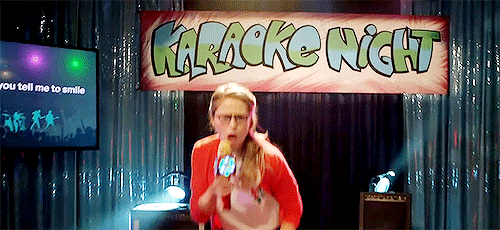
10 Tips to Master Kara-oke
[aka: I found a list online and turned it into "Life-Lessons with Supergirl"]
Song selection - Know your song!
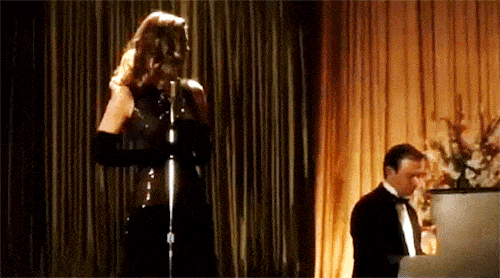
Project Confidence!

Warm Up Those Vocal Cords

Engage and Entertain.
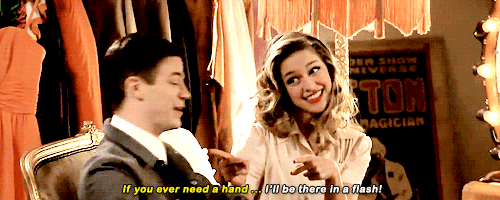
Dance Like No One's Watching

Embrace the Drama (And Comedy)
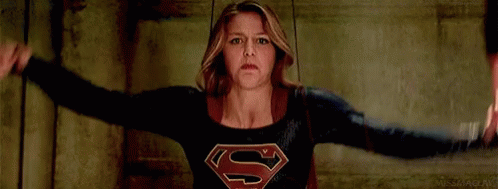
Embrace your imperfections
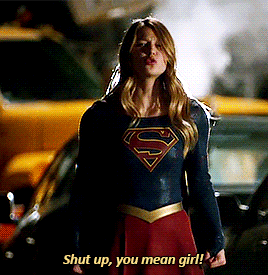
Rally your Friends

Embody the Legends

And never forget: It's all about having FUN!
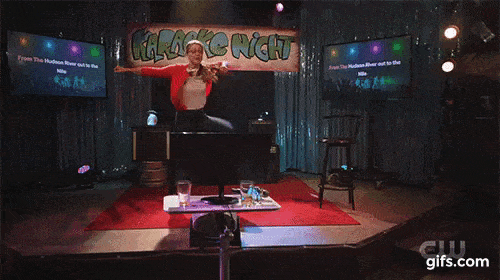
5 notes
·
View notes
Text
Lena Luthor (PhD): *puts glasses on and looks in the mirror* Ahhh!!!! Who the fuck is that???
967 notes
·
View notes
Text
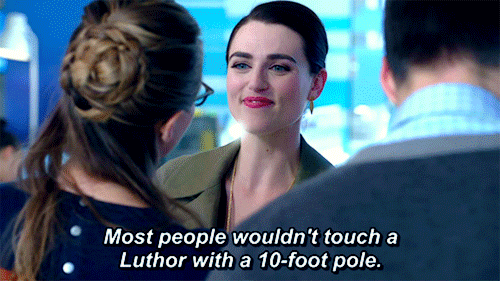
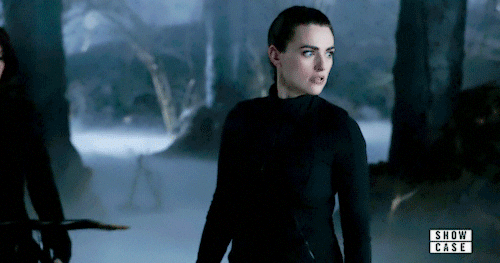
2K notes
·
View notes
Text
Katie's Lena's Cleavage
Just a self-indulgent collection…
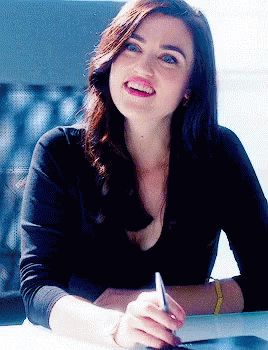




(Jacket-flap is making a brave attempt, tho.)
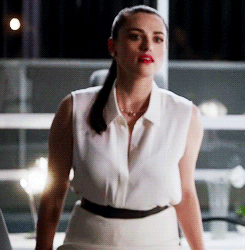

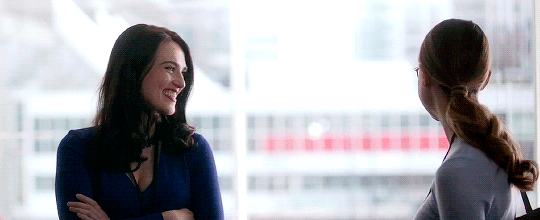
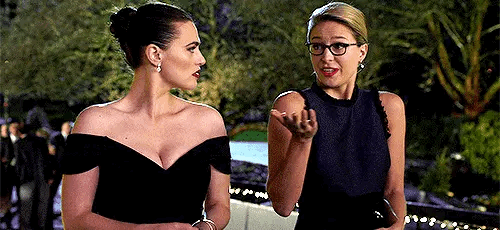
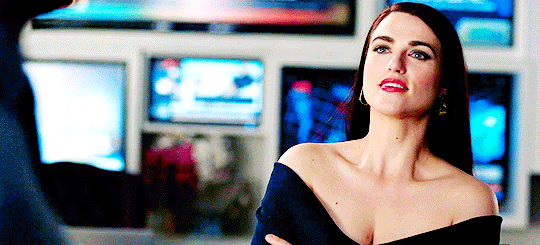
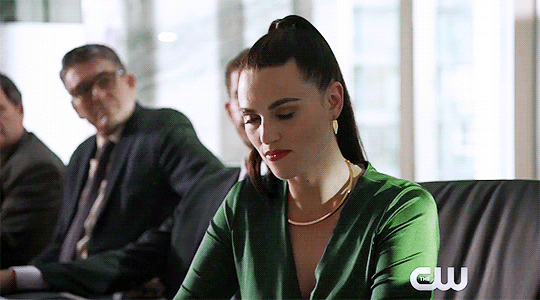
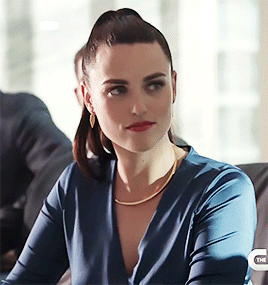
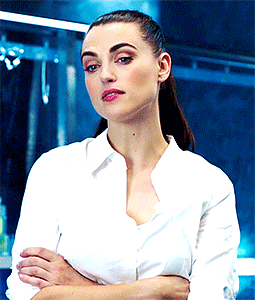

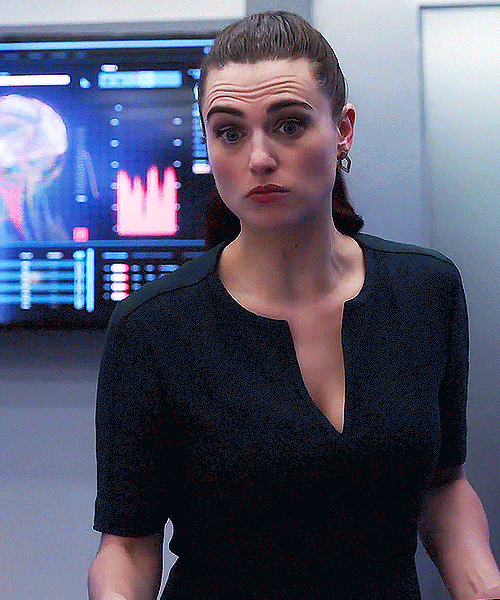
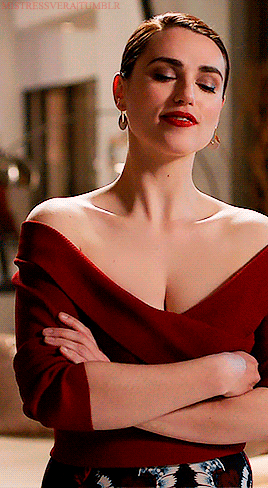
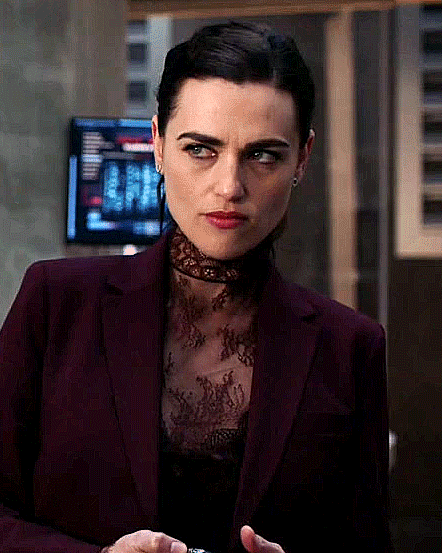
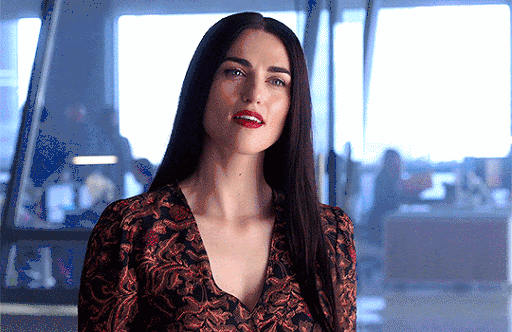
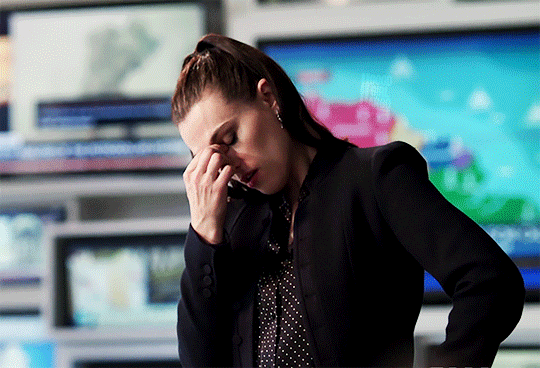
(☝️Give that gif a moment ^_- )
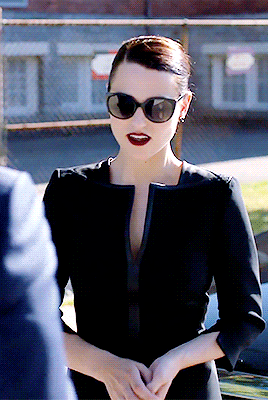
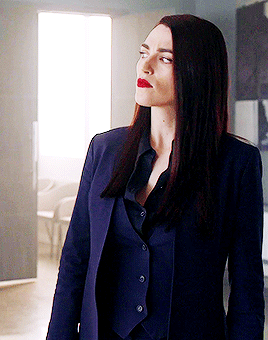
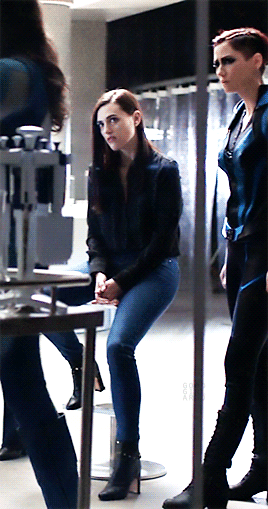

Top buttons are merely decorative...
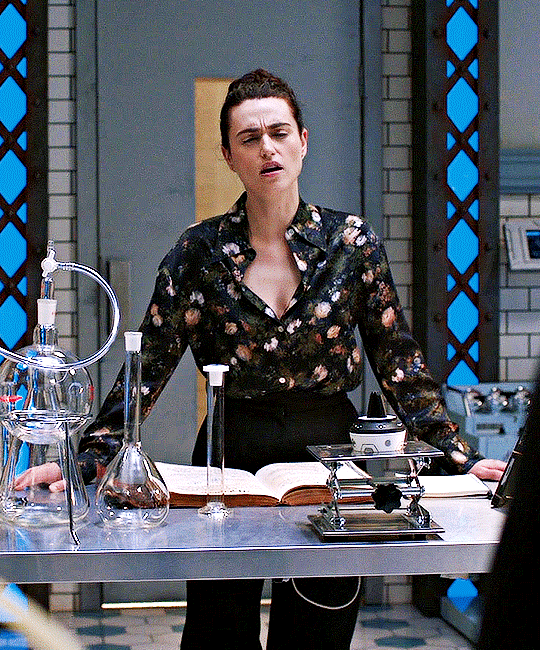

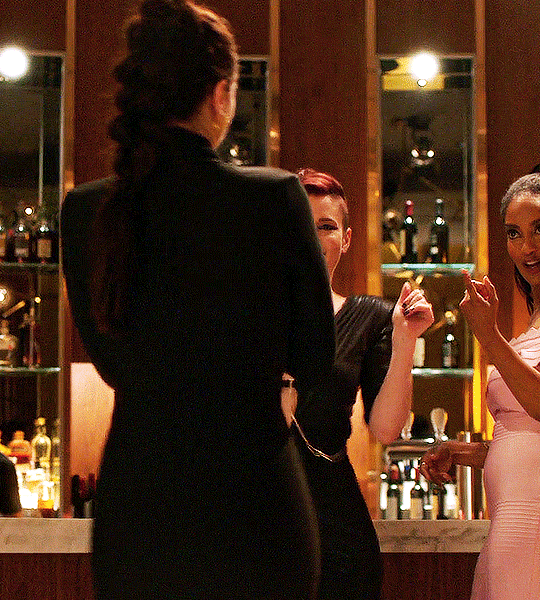
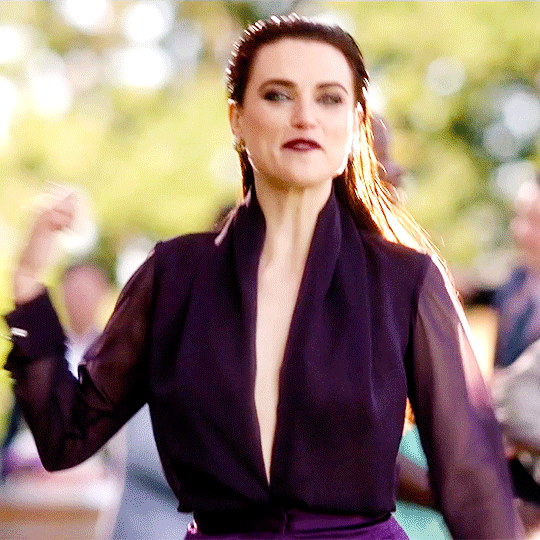

...I think she simply gave up on buttons at this point altogether...
But I CAN see where she got her inspiration from...

#Lena's cleavage#Lena Luthor#Supercorp#Katie McGrath#Supergirl#If I had half as much determination as Lena's clothes trying to keep her chest covered I would be somewhere in my life...#none of the pics or gifs are mine!#incomplete#thanks to all the gif-creators#kue doing kue-things
120 notes
·
View notes
Text
Kara's love language
It is rather easy to find scenes of Flirty!Lena (or Katie I-can't-help-it McGrath).
But how does Kara flirt / show her affection?
My answer is simply:
Whenever she brings / shares food. 🍕🍩🥰
(and, yes, there are plenty moments Kara shares food with her beloved sister and her at the time boyfriend Mon-El - she even receives food from James and others, but bottom line is food is Kara's love language)
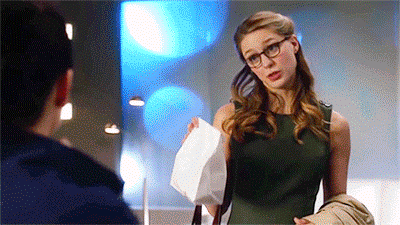

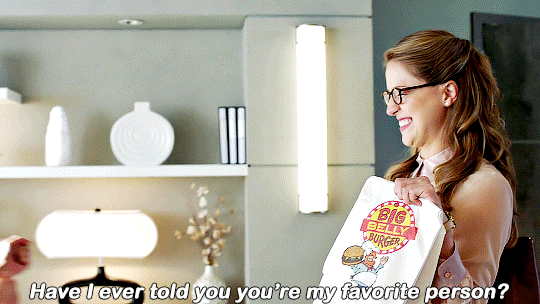
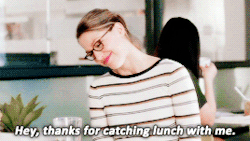
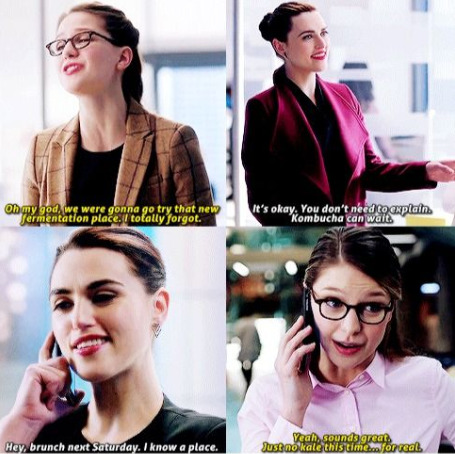
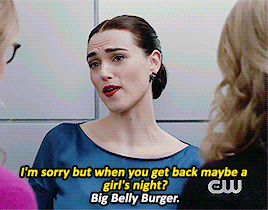
(Even RedDaughter is aware!
...which makes me think 50% of Kara's diaries are about food and food places and whom she shared them with...)
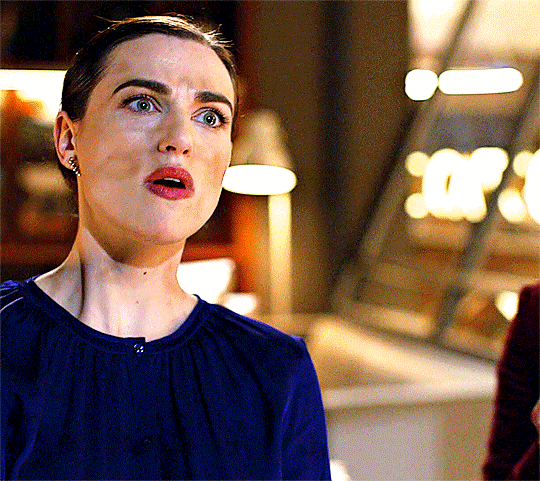

(someone pointed out how you can see her abs through her dress 👀.
...so I suppose sometimes she brings herself as a snack?)
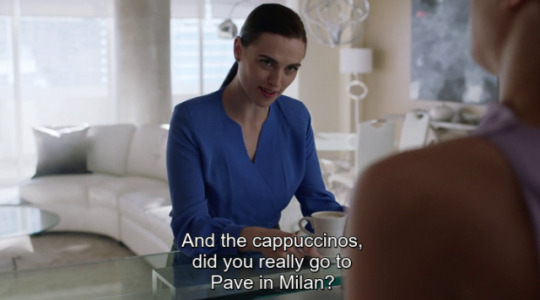


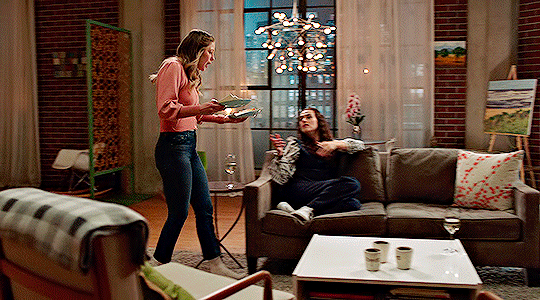
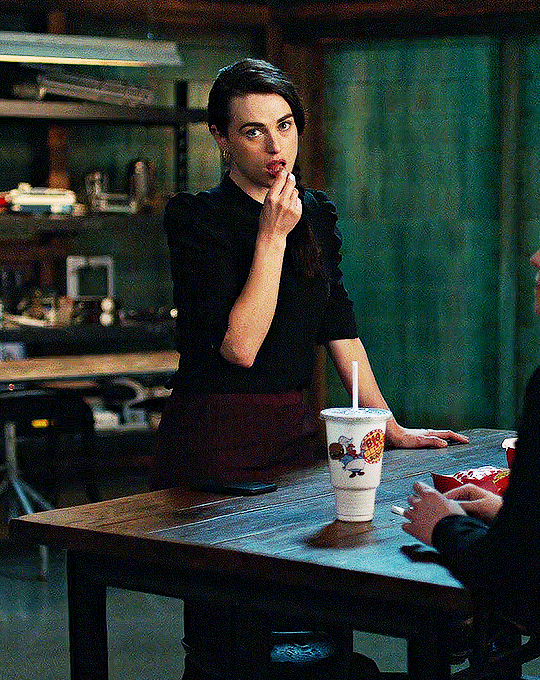
(…sometimes Kara on a TV is the real snack…)

Been talkin' 'bout yourself, Kara?

Girl's got a big heart stomach.
Anyone mad at me for not adding all the Mon-El & Kara scenes involving food, will just strengthen my point >.>
#supercorp#kara danvers#love language#lena luthor#supergirl#food#none of the pics or gifs are mine!#the hungry-Lena-TM gif is easily my fave#list would be longer but I cannot make gifs myself so I need to rely on what the fandom provides#lots of thanks to all the gif-makers!#apparently that IS a skill
349 notes
·
View notes
Text
on bingewatching cwsg and character perception
this is something that i’ve thought about writing down before, but yesterday (today? close enough) i read this post from fazedlight on spending time with characters and also this post crossed my dash.
i’ve also spent a lot of time fixated on the rift, but for me what a lot of these musings originally bubbled out of was trying to figure out why my views on some of the characters varied so differently from accepted fanon, and in particular why i often felt like my own views on kara seemed so harsh compared to others in the fandom, particularly when i started venturing into reading fics two years ago.
i bingewatched all of s1-s5 of supergirl over a few weeks during the s6 midseason break, which means i caught up just in time to watch giant cats terrorise national city and learn that lena was from newfoundland before watching the finale in realtime.
since then i’ve rewatched the show a couple of times mostly for factchecking fic and i really do think that my perception of kara is likely much more negative as a bingewatcher late to the fandom compared to watching it unfold in realtime.
mulling it over, i think one of the major reasons for this is that the writing in cwsg is - as we all know - spectacularly uneven. this is maybe stating the obvious, but this type of bad writing is really exacerbated very badly by bingewatching rather than taking the episodes in with a one week gap in between to smooth over the inconsistencies across a season.
as a slightly more neutral (🥴?) example, one of the characters that i think this damages the most is james olsen.
the intent of james is clear: he’s supposed to be steady, supportive, trustworthy, kind.
the problem is, if you watch season one over the course of a weekend instead of 6 months, it means that you don’t get three weeks to decide you think james and kara could be a thing before lucy shows up, you get an hour and a half. nothing has time to really settle or get smoothed out; james looks like a total cad* because all of his ex drama plays out over the course of 12 hours of kissing lucy lane and going to get dinner with her disapproving dad while being all will-they-won’t-they with kara danvers.
(*to me. ymmv ofc.)
similarly, you don’t get six months to forget how much james hates lena and all things luthor between season 2 and season 3. there’s no reset to reframe the idea that james and lena have a grudging mutual respect now if you don’t take the summer off, and no one week increments to nudge you towards getting used to the idea that you should get used to seeing them together.
i think you can kind of see it as well in the way james and winn and even maggie have faded somewhat from fic? newer fans to the franchise simply don’t develop an attachment to them, because they’re quickly replaced by brainy and nia - who had much more even characterisations. season by season fans spent 3 - 4 years getting to know james and winn; in a bingewatch, they very quickly fall by the wayside.
likewise, kara doesn’t have that extra year to have grown on you if you bingewatch, especially if you know lena is going to show up and are anticipating that they will have some sort of dynamic. (i didn’t have much of an idea of what the story was going to be about; i wasn’t even sure if they were canon or not, i just knew this character was going to appear.)
there’s been a lot of commentary on inconsistency and backstory and retcons, but i think one of the interesting unintended effects of the show frantically trying to keep lena separate from the superfriends and contained in smaller episodes so she doesn’t flirt too much with kara is that because the cwsg writers seemed intent on corralling lena in her own part of the story, the writers had less opportunities to make her act completely differently from one episode to the next. her arcs were smaller and therefore less prone to being completely derailed.
as a result - and especially in comparison to most of the major characters - i really do think lena ends up having maybe the most consistent characterisation across her entire time on the show.
for example, i think most people agree lena’s most ooc moment was s5 - but for all that non nocere was a bad idea, i do think it’s actually fairly easy to follow the logic that leads lena there, especially isolated as she is.
for the most part, lena’s motivations and her reactions in s2 through to her ‘villain arc’ in s5 are pretty consistent. lena wants to do good; at the same time, lena is headstrong and - understandably, considering her backstory - not great at asking for help. lena has a complex where she is very hung up on atonement; she’s also very good at what she does, and she’s prone to hubris. (interestingly, lena is aware that she is prone to hubris.) we are told right from the start that lena knows she lashes out when she’s hurt.
non nocere was dumb, but it’s not that difficult to see how lena luthor, blinded by hurt, might decide that preventing people from hurting each other was a bad idea. (this isn’t even really necessarily a villain arc; cwsg was just never really willing to delve into the nuances that even the mcu who, again, are not exactly a bastion of complex storytelling or depth did: tony stark’s ultron and nick fury’s project insight are both about this line of thinking, with steve rogers reminding everyone that every time someone tries to win a war before it starts, innocent people die.)
lena’s characterisation is fairly consistent as someone who is brilliant and consistently means well, who has human flaws and fumbles, and i think that makes her relatable and empathetic rather than what maybe was intended.
(where the show is inconsistent and retcons lena’s characterisation is to make it seem like kara actively pursued her friendship and that her brother was abusive towards her right from childhood without her knowing; these actually have the effect of better justifying her later reactions by, frankly, making lena’s past even more aggressively tragic.)
conversely, the characterisation of the other superfriends - most noticeably kara and alex - is all over the map. but when you speedrun all six seasons, i think lena garners more sympathy even than intended because of the inconsistency in how she’s treated by the superfriends.
instead of having their inconsistencies smoothed out over one week increments, a lot of the uneven writing for kara’s actions with lena in particular ends up looking like hypocrisy.
for instance - the timeline over which kara goes from ‘i was selfish’ to ‘i only did one thing wrong’ isn’t the six months of a network tv season, it’s maybe three days to a week.
looking at wiki, there was a two week gap between lena leaving kara in the fortress (nov 17, 2019) and mount norquay (dec 1, 2019); the series then vaults into crisis on dec 8, and the bottle episode reacquainting everyone with earth prime doesn’t happen until after christmas break on january 19. mxy happens february 23. lena leads kara on from e1 on oct 6 for six weeks before the fortress confrontation.
does that lead to more anger with lena or more dissecting kara’s actions during the in between?
i’m not sure, but what i don’t think i considered before reading fazedlight’s post is the built up expectations that people had over developing three years worth of headcanons about lena, whereas when you watch all of the seasons in one go i don’t think her progression seems that far off from what you might expect.
(conversely, bingewatching makes kara seem like she’s turning on a dime all of the time. it’s worth pointing out that it actually gets worse - and there was a recent post that summed it up with gifs - when you do a second rewatch and take note of how heavily secret keeping is used as a source of conflict for kara and the superfriends, with kara flipping out every time she doesn’t know something.)
i’m wondering too if this is why it feels? like? people are more sympathetic to lena than they were before - i have no proof of this at all and it may just be that i’ve applied my own filter to what i get exposed to in fandom, but it feels a little bit like there’s a shift towards people who are more sympathetic to lena about the happenings during the rift.
anyway. just some thoughts.
#supercorp#the rift#binge vs weekly#cwsg#inconsistencies#kara's double standards#lena luthor#lena's possibly the show's strongest character#even above the titular hero!
188 notes
·
View notes
Text
Kara's orientation? - Pilot vs. rest of the show...
Kara Danvers:

Also Kara Danvers:

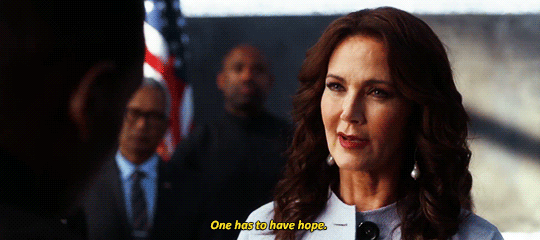
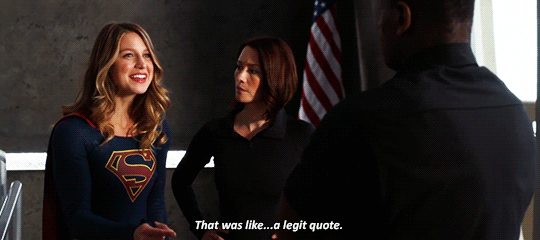
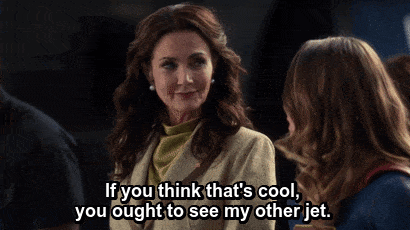
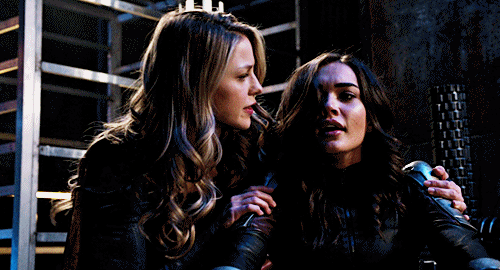
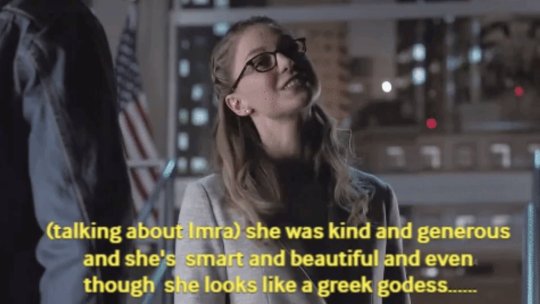
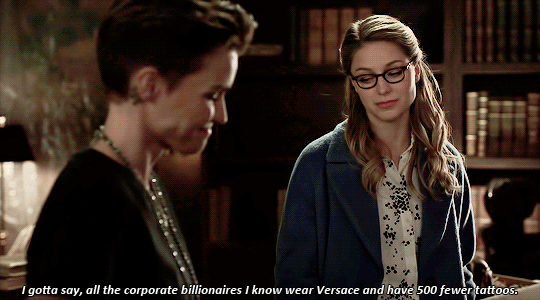
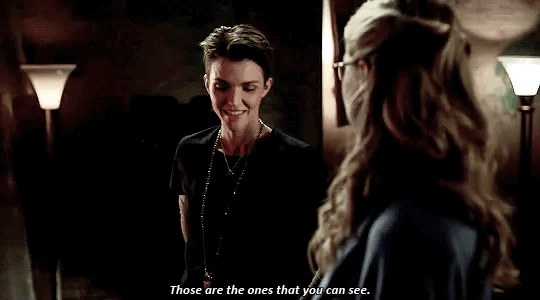



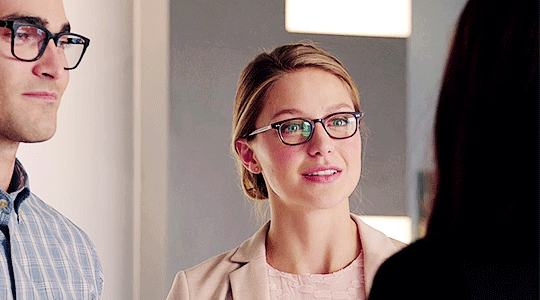

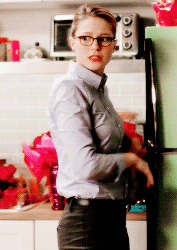

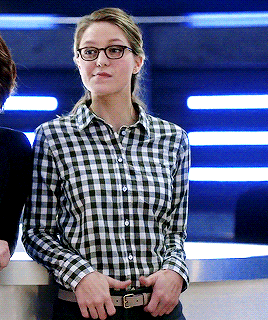
...😉😏

I mean, technically, as an alien / Kryptonian who dated humans and a Daxamite, she's at least pan [Etymology: Ancient Greek: πᾶν, romanized: pan, meaning "all"] so she didn't lie back in the pilot?
#supercorp#supergirl#kara danvers#fandom can spin this however they/we want ;)#labels are helpful but also silly#kara's sexuality#gentle reminder that Kara x-rayed through Batwoman's clothes...#gifs not mine#lots of gifs#me not gonna touch on Kara's dynamic with Cat for this
120 notes
·
View notes
Text
Just had a chuckle, bc I googled Supercorp gifs and amidst the results these two appeared on top of another:
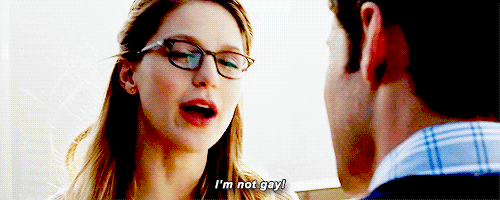
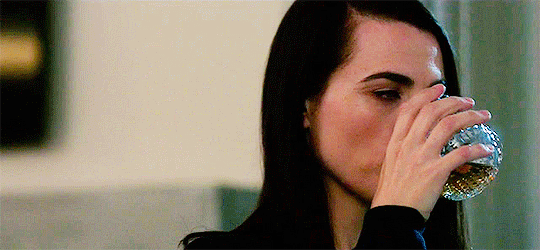
12 notes
·
View notes
Text
"Because I'm in lesbians with you."



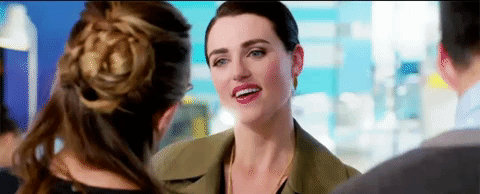
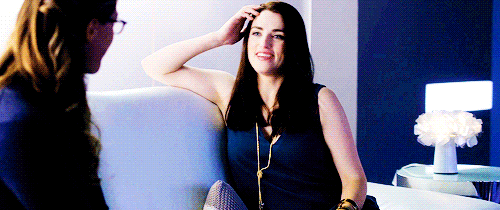



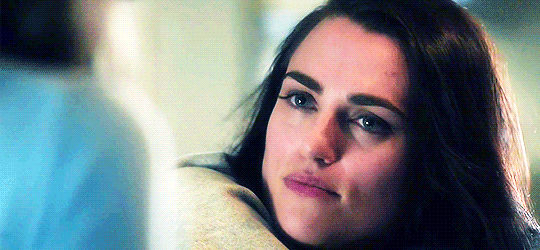


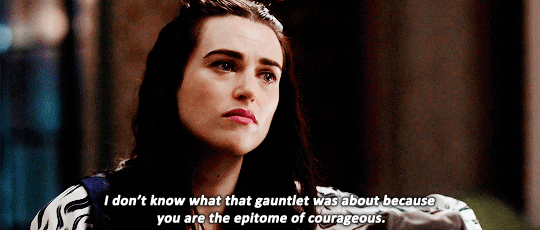


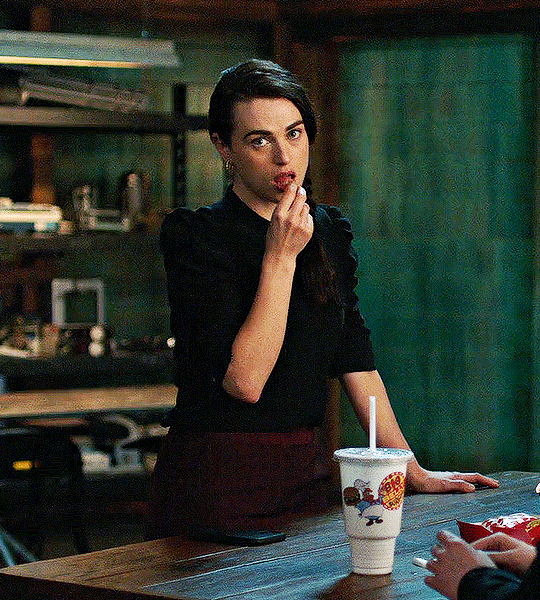


Lena Luthor, probably:
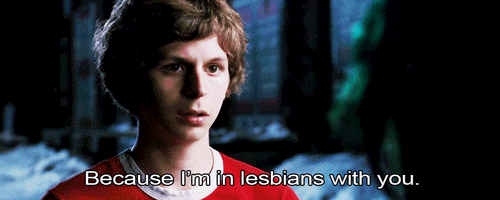
Kara Danvers:
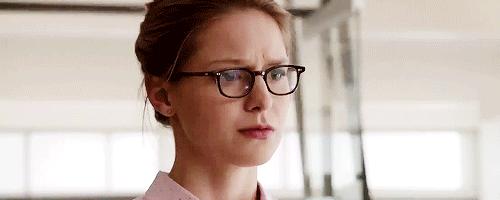
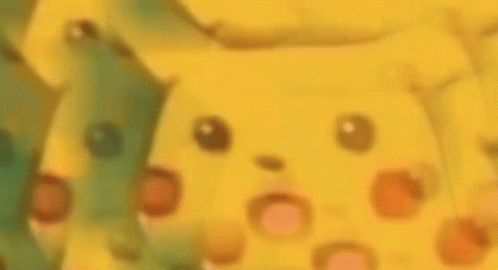
Also Kara Danvers:

#supercorp#lena luthor#thirsty for Kara Danvers since 2016#incomplete gifset#gifs not mine#kara danvers's surprised pikachu face#do these glasses impair her vision that much?#kue doing kue-things
330 notes
·
View notes
Text
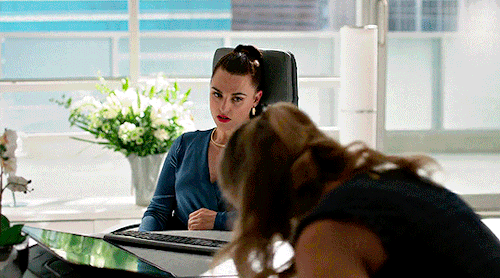
If this aint homo, idk what is.
924 notes
·
View notes
Text
Just me once more appreciating how far Lena Luthor has come in the show...
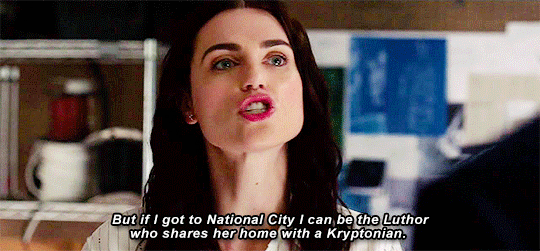
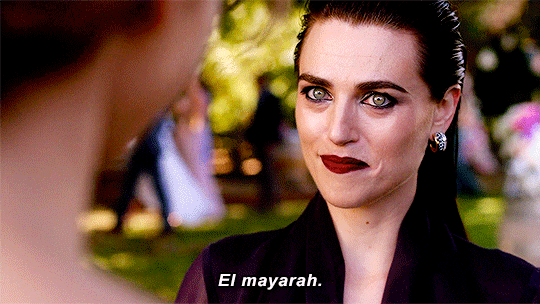
927 notes
·
View notes
Text
Fanfic Crossover Prompt?
I noticed there are way too few Clexa and Supercorp Crossover Fics...
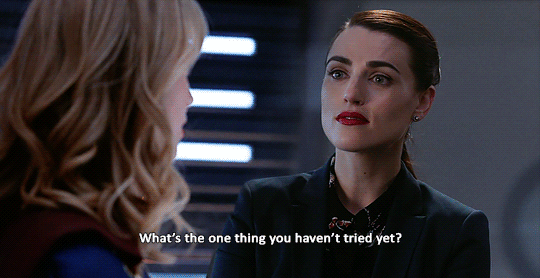
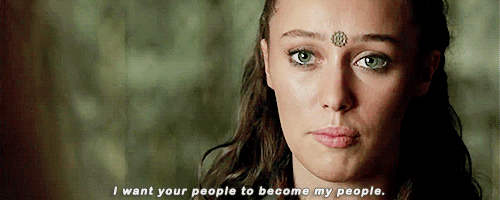
Just hear me out, k?
Supergirl /DCTV has established parallel worlds and plenty (accidental) ways to end up in an alternative world. Time travel is also very much established (kinda sorta in both shows)
The 100 canonically even has aliens (but this would be better!)
Each ship has a "blue-eyed blonde that came from the sky (from a more scientifically advanced world)" and an "ambitious and revolutionary green('ish)-eyed brunette in a powerful position"
...with the blondes being artistically inclined and the brunettes educated strategists
Lena and Lexa may have a secret hand-shake over the whole "love is weakness" mantra (or just cooly blank-faced share a nod of mutual understanding)
Kara's cousin is named Clark and Lena's brother is named Lex (Clexa: "Oh, are they close?" - SC: "...well, they are constantly at each other's throats?")
Nia would be very confusing - especially if she's still alive, bc seeing her may give Lena a mini heart-attack
Jackson may also look vaguely familiar to Kara...
(Charlotte would prolly already be "gone"...)
There is fun to be had with the character dynamics, Lexa and Kara being the heart-eyes ones, Clarke and Lena (whilst just as infatuated) try to play things cool
Lena would have a field day with the night blood (actually, she'd need a fix to survive in the radioactive world of The 100, unless she has a magical solution at hand)
Kara could single-handedly fix the 2nd Praimfaya situation (with some guidance by Lena)
Raven and Lena prolly would hit it off rather well
by the power of fanfic even the age difference between the characters can be either reduced or ignored
or Lena and Kara become sort of mentors / advisors to Heda and Wanheda
Lexa having a sparring session with "Olympics level fencer" Lena
Kara and Clarke ooh'ing and aaah'ing at Earth's nature together
Kara getting roped into beer-pong and owning it even without using her powers, not for her skills but bc she can't get drunk
Clexa may even help a canonically supposedly "best friends" Supercorp to "see the light" (Clexa: "Uhm, guys? That is not really what best friends are for...")
Play with Lena struggling in the forest or prove herself to be actually pretty apt in her survival skills
Lena coming into Polis being all like "I can fix this up. Someone give me some paper. Kara, time to flex those muscles of yours."
Kara "accidentally" sneezing too hard and freeze-breath scaring the daylights out of Titus before baldie can screw things up
Katie Lena in a more medieval leathery get-up!!!!
Kara on a horsey!! (or floating next to the group riding, cooing at the animals)
Both Kara and Lena having experience with "adults" and their schemes and politics messing things up, spot signs early and help Clexa take care of Pike et others...
Eventually (after saving their world) Lena finding the energy signatures below polis of the portal-thingy, figuring the puzzle out in 3.7 seconds and rewiring it to send them back home...
...and so. much. more!
But, really, it can go anyway you'd like:
Fun and light, or more serious and angsty; a whole fix-it for The 100 or set anywhen you want, pre-Kara's identity reveal (s3'ish?) or post-finale (witch!Lena ?); innocent or smut; SC just being the "little helpers" or ultimate heroes; lovey-dovey or tension-filled Clexa; powering down Kara somehow or just letting her be her super-charged self; a short adventure or a novel-sized tale...

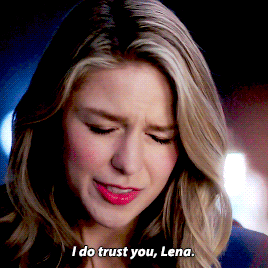
Please, dear authors, feel inspired! ö.ö

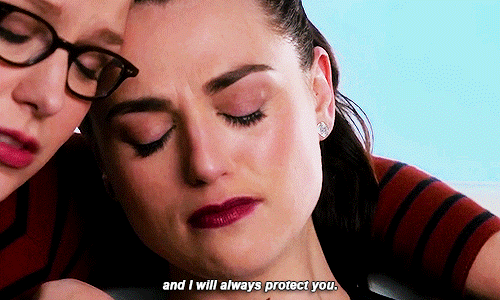
#supercorp#supergirl#lena luthor#clexa#kara danvers#kara zor-el#fanfics#heda lexa#clarke griffin#fanfiction prompt#crossover#just a thought k?#the 100#gifs not mine
15 notes
·
View notes
Text
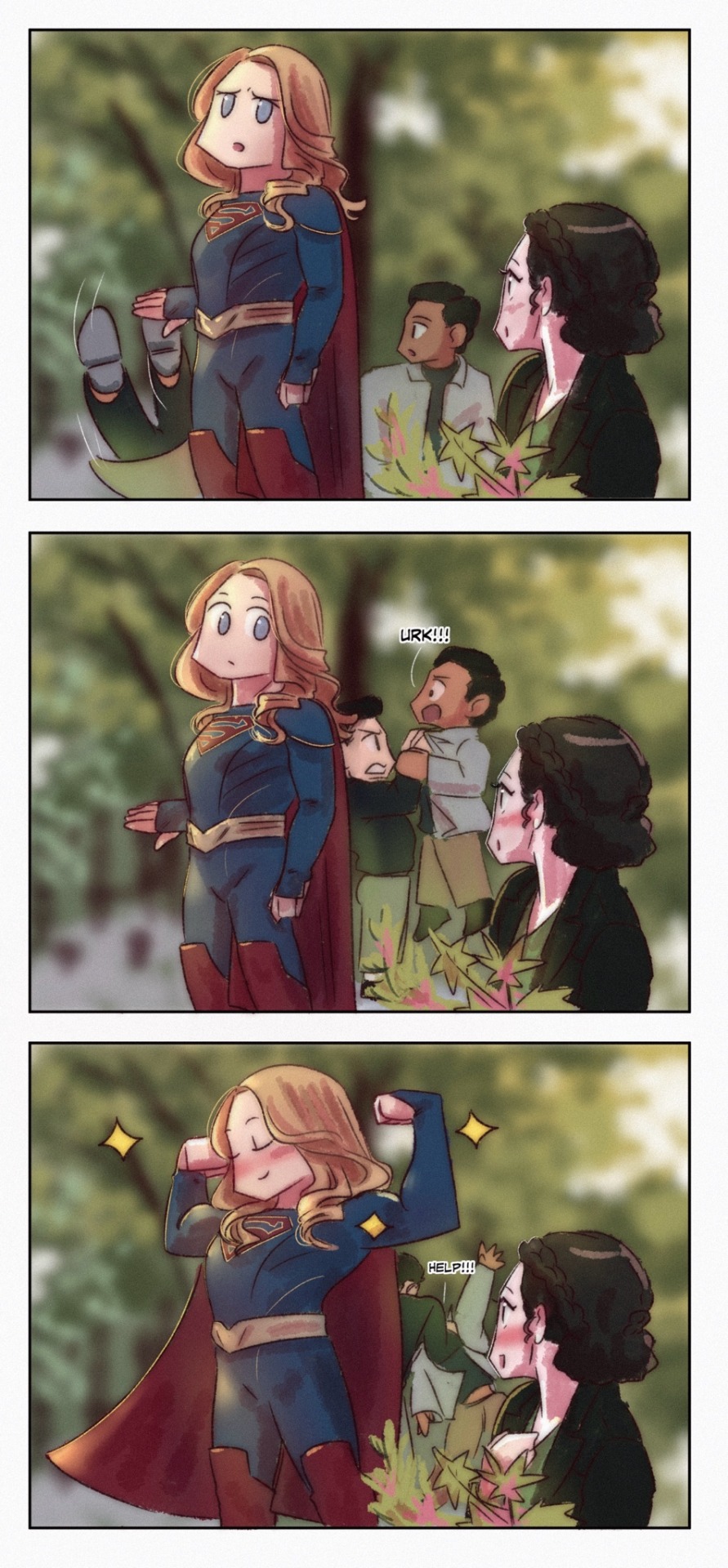
A day in a life of a superhero.
2K notes
·
View notes

